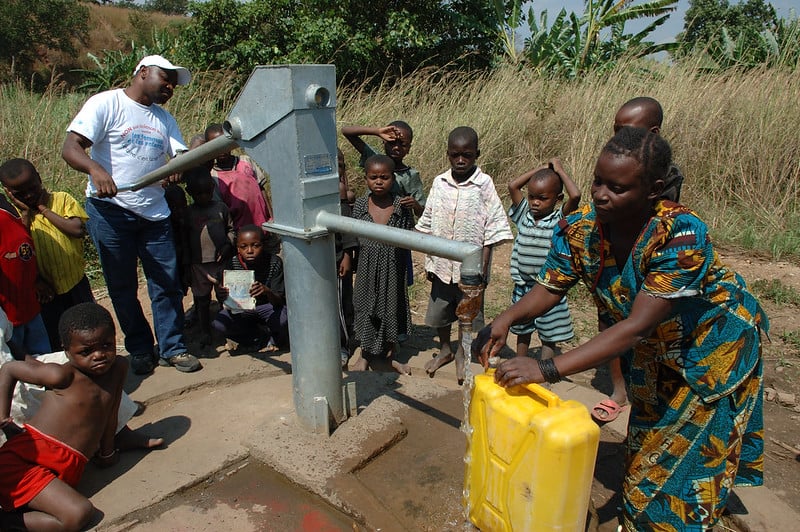Life might have required rugged individualism, “the gene for itself” type of selfishness (Richard Dawkins, Ehtologist). Indeed, the arts and humanities field is filled with stories of heroes who have singlehandedly saved their countries. Despite those inspirational tales, sharing fits the human security goals more appropriately, for example, water for all.
Indeed, it is generally agreed that shared information offers the best opportunity to solve the issues of drought, pollution, warming, and so on because no single agency, entity, or host can address the human condition by itself. A mind shift has occurred from the hero with a million memes. It is this paradigm leap that this writer will seek to describe.
In the World, people played chess like pieces on a black and white board. The ultimate end of the game of chess is winner-takes-all all. No consideration for the losing side is necessary. This school of thought made it easy for the winners to ignore the plight of at-risk and vulnerable populations on the World’s margins.
Taken together, the picture of rich and poor is undoubtedly checkered. The World is thus divided, between haves and haves not, literally showing the image of people existing in silos. Yet, there is a common accord: life is interconnected.
In light of this paradox, a team of researchers from the School of Public Administration and Management (SOPA) at Mzumbe University initiated eWATER Governance as part of a country-wide effort to increase citizen participation using electronic (participation).
It must be noted that this writer is on the team seeking to build a simulator of the eWATER Governance model. Let us return to game theory, a concept John Von Neumann invented.
The late physicist David H. Bohm wrote years ago, “There is no plan to change”. Hence, observers of geopolitics concluded that if a person and country could plan change, the Soviet Union would have won the Cold War. Instead, the United States (U.S.) was declared the winner (circa 1981). The U.S. has since taken over as the only superpower in the World.
But it is not clear. Thinking leapt forward because the disparities and gaps in income, riches, and wealth still permeate poverty in the World. Nonetheless, this is not the time for despair. Instead, the old game must be replaced by new plays. Thus, this writer proposes Collaboration with everyone who can and is willing to create change.
Almost everywhere on Earth, the word revolution sounds louder and louder. This call is an act of qualitative change. It undoubtedly means the behaviours of the World must not be repeated in the present. The puzzle game illustrates this present-day thinking that goes forward, leaving the World behind. A puzzle usually contains many pieces that one, two, or more participants must assemble.
In the game, looking at the picture is not the exclusive domain of a few higher-ups. When a puzzle piece is incorrectly placed, every participant can see it does not fit. It must be noted that puzzle games offer a glimpse of objective reality. According to Bohm, “A person cannot see objective reality.
He said, “You can only see what makes sense or does not make sense, what is coherent or incoherent.” In Collaboration, like putting a puzzle together, all the participants can see the model they are building. It ensues. Collaboration, like putting together a puzzle, yields win-win outcomes. Every participant in creating change is a winner.
Let us consider, for instance, the eWATER Challenge, designed to find out how to connect every household to water. Every day, many girls and women carry water from the well, fountain, or river on their heads. They often must walk for hours to bring the water they collect to their homes. The water is mainly used for bathing, cooking, drinking, washing, etc.
The eWATER Challenge assumes the supply chain can be improved through citizen engagement (eparticipation). Therefore, the eWATER Challenge seeks to answer the question, what would you do to carry water home?
A recap of this article shows it will take villages to provide water for all. The system is too complex for one leader or one single intervention to make the water flow in and out of every factory, farm, field, and home. The point is the citizens must share information about water or other issues they possess.
The current Government of Tanzania is actively encouraging the citizens to do so. This is sound public policy because, in the market economy, knowledge is a resource that management theorists like Peter Drucker consider more valuable than capital. The abundance of waterways in Tanzania offers Tanzanians economic opportunities to launch start-ups to develop the water industry. They can easily do so with a focus on innovation and technology.
In conclusion, climate change places a test of creating change on the path of Tanzanians. The research team at Mzumbe University is proud to be among the institutions preparing Tanzanians to lead qualitative change.
Read more climate change & conservation insights here.

